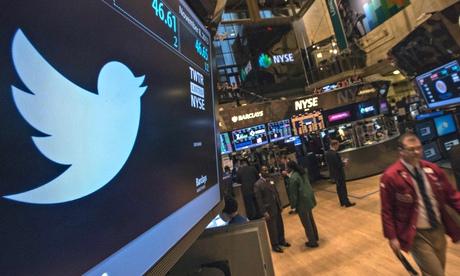
Fledgling public company Twitter fell out of its nest last week. The microblogging platform redefined stock-market volatility when it lost a quarter of its share value in a single day. Investors headed for the exits after new numbers indicated that the once fast-expanding twitterverse may have reached its natural limit.
From 15 February, some of Twitter's employees will be free to sell their shares for the first time since the flotation. The majority of Twitter stock – 87% according to the prospectus – is owned by directors, employees and early investors.
The 10m shares in the first lock-up batch mostly belong to employees, who are allowed to sell in order to settle tax bills on previous stock awards. But the vast majority of insiders – including founder Jack Dorsey and Suhail Rizvi, the secretive speculator who is Twitter's biggest backer – will have to hold on until early May.
The lesson from Facebook in 2012 is that Twitter is unlikely to recover much of the £9bn lopped off its valuation before May. When insiders begin to cash in, the flood of new shares available for public trading will push prices down, and long-term investors waiting for the right time to buy in are likely to bide their time until that happens. For now, the blue bird's wings remain clipped.
EasyJet bosses face a buffeting over pay
And it's off to Hangar 89 at Luton airport on Thursday for the easyJet annual general meeting. The budget airline's headquarters, in a big orange shed under a flight path, is hardly your typical millionaire's playground. But easyJet is on the up, and its directors are worth quite a bit more than they were this time last year. Chief executive Carolyn McCall nearly doubled her remuneration to £6.4m, while chief financial officer Chris Kennedy more than doubled his to £3.7m. The shares have been performing so well that founder Sir Stelios Haji-Ioannou rejoined the Forbes billionaire ranks last March.
Under new City rules, easyJet will for the first time face a binding vote on pay. A three-year plan will give McCall a maximum of £4m a year, but it has to be approved by at least half the shareholders. With easyJet about to disburse lavish dividends, she could earn a further £1m this year on her shareholding. A spokesman for Stelios says he is planning to vote his 37% family stake in favour of the dividends – worth 77p a share and a cool £112m to the founder and his siblings – but against pay. Fasten your seatbelts, there may be turbulence ahead.
Chancellor shouldn't bank on Lloyds sell-off
The parliamentary inquiry into what has been described as the botched privatisation of Royal Mail is still going on, but already the chancellor is gearing up for his next big car-boot sale.
When Lloyds Banking Group reports its full-year results on Thursday, boss António Horta-Osório will be banging the drum for privatisation, which could take place before Easter. The sale of the first tranche of the taxpayer stake in September at 75p a share raised £3.2bn and left 33% still to be disposed of.
Retail investors are expected to be offered the chance to take part, and Horta-Osório hopes to lock them in with promises of generous dividends.
The sale can't take place before 6 March, when the fully audited results are published in the annual report. At least Lloyds won't be able to spring any more surprises about its PPI mis-selling provision after stunning the City last week with another £1.8bn hit – taking the total bill for this scandal to almost £10bn for Lloyds alone.
The bank already has 2.7 million private investors after its 2008 rescue of HBOS. These shareholders were once customers of the Halifax building society which, when it demutualised, gave its shares away for free. After Royal Mail, George Osborne will want to avoid any accusations of doing the same thing with Lloyds.

